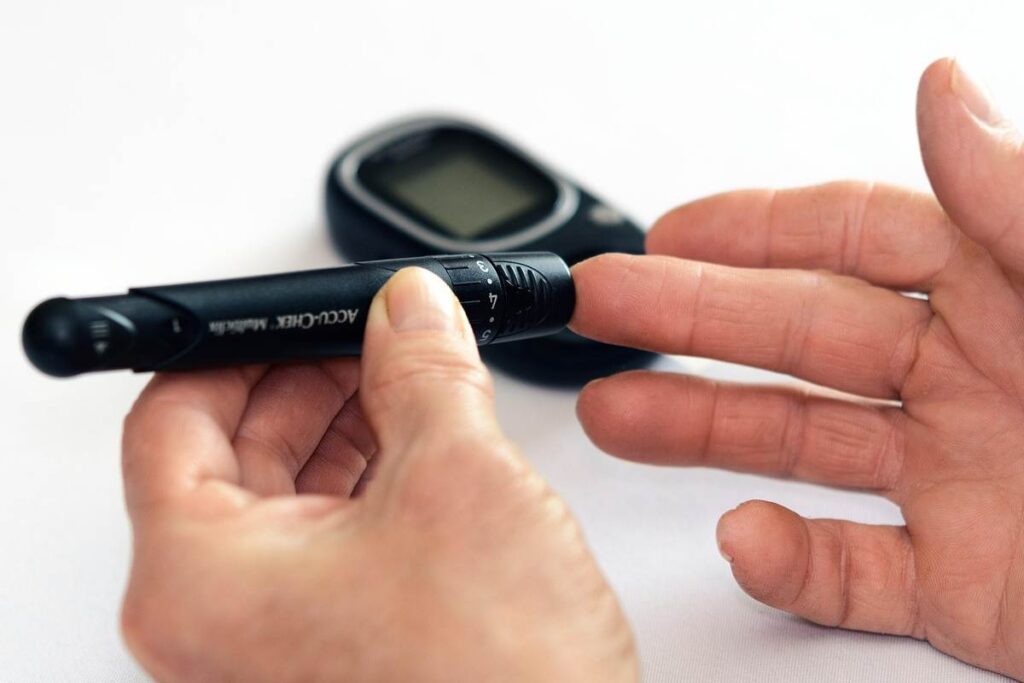A glucose test (or glycemia test) is an essential diagnostic test that measures the blood glucose level. It helps detect diabetes, prediabetes, and other metabolic disorders. Regular monitoring of glucose levels is necessary for maintaining good well-being and preventing complications associated with high or low glucose levels.
What Does a Blood Sugar Test Check?
A blood glucose examination measures the amount of glucose in the blood. Glucose is the body’s primary energy source, and its levels must be regulated to maintain overall health. This test is commonly used to:
- Diagnose and treat diabetes (type 1, type 2, and gestational diabetes).
- Monitor blood glucose levels in people with excessive thirst, frequent urination, or fatigue.
- Assess glucose tolerance in pregnant women (gestational diabetes screening).
- Assess the effectiveness of diabetes treatment plans.
What Is the Normal Range for Plasma Sugar?
The normal blood sugar levels vary based on whether you are fasting, have eaten recently, or are undergoing a glucose tolerance test:
|
Test |
Normal Range |
| Fasting Blood Sugar (FBS) | 70 – 99 mg/dL |
| Postprandial Blood Sugar (PPBS) | Less than 140 mg/dL (2 hours after meal) |
| Random Blood Sugar (RBS) | Less than 200 mg/dL |
| b1k | Below 5.7% |
Abnormal blood sugar levels may indicate diabetes, insulin resistance, or other metabolic conditions.
Blood Sugar Test Price in India
The price of a blood glucose test varies depending on the type of test and the medical centre. Max Hospital offers comprehensive blood glucose testing with accurate and timely results.
The cost of a blood glucose test at Max Hospital is affordable, ensuring that the service is accessible to all patients. You can find the exact prices on the hospital website or by contacting the diagnostic centre directly.
Diseases That a Blood Sugar Test Can Detect
A blood sugar test helps diagnose and monitor several medical conditions, including:
Diabetes Mellitus (Type 1 & Type 2)
A chronic condition in which the body does not produce enough insulin (type 1) or does not use it effectively (type 2). This leads to high blood pressure levels and requires lifelong treatment.
Prediabetes (Early Signs of Diabetes)
An alarm stage in which blood sugar levels are higher than usual, but not yet diabetes. This can often be corrected by changing diet and lifestyle.
Gestational Diabetes (Occurs During Pregnancy)
It develops during pregnancy when the body has difficulty controlling blood sugar levels. It usually goes away after delivery, but it increases the risk of evolving diabetes in the future.
Hypoglycemia (Low Blood Sugar Levels)
A state in which blood sugar levels drop too low, causing dizziness and weakness. In severe cases, loss of consciousness may happen if left untreated.
Hyperglycemia (High Blood Sugar Levels)
This occurs when blood sugar levels are also high, often due to diabetes. Symptoms include extreme thirst, frequent urination, and fatigue.
Metabolic Syndrome (Increases Heart Disease Risk)
A group of conditions, such as high blood sugar, obesity, and hypertension. It raises the risk of diabetes, stroke, and heart disease.
Blood Sugar Test Results & Their Interpretation
Once you get your blood sugar test results, here’s how to interpret them:
- Regular Blood Sugar: Your glucose levels are within the healthy range.
- Prediabetes: Blood sugar is slightly elevated, indicating a risk of developing diabetes.
- Diabetes: Consistently high glucose levels indicate diabetes, requiring medical attention.
- Hypoglycemia: Low blood sugar levels may cause dizziness, shakiness, or fainting.
Your doctor will analyse the results and recommend the necessary treatment or lifestyle changes based on your health condition.
Composition and Ingredients of a Blood Sugar Test
A blood sugar test is a laboratory diagnostic test and does not contain active pharmaceutical ingredients like medicines. However, the key components of the test include:
- Blood sample collection (via finger prick or vein).
- Glucose testing strips (for home tests).
- Glucose meters (for immediate results).
- Laboratory analysis (for advanced testing like HbA1c).
Uses of a Blood Sugar Test
- Routine Health Checkups – Helps detect diabetes early and monitor glucose levels.
- Diabetes Management – Essential for people with diabetes to adjust medications and diet.
- Pre-Surgical Assessment – Ensures normal glucose levels before surgery.
- Gestational Diabetes Screening – Helps pregnant women prevent complications.
- Emergency Diagnosis – Identifies causes of fainting, confusion, or seizures.
Side Effects and Risks of a Blood Sugar Test
A blood sugar test is a safe procedure, but some individuals may experience minor side effects, including:
- Mild Bruising – A small bruise may appear where the blood sample was taken.
- Dizziness – Some people feel lightheaded after the test.
- Slight Pain – There may be mild discomfort at the blood collection site.
These side effects are temporary and usually resolve rapidly.
Take Control of Your Health with a Blood Sugar Test!
Regular blood glucose testing is key to early detection and treatment of diabetes. Max Hospital offers comprehensive and accurate blood glucose testing, whether you need a routine checkup or a diagnostic test.
Book your test today! Get fast results, expert advice, and top-notch care at Max Hospital.
Call now or visit Max Hospital to book your appointment!
Frequently Asked Questions (FAQS)
Can a blood sugar test be done at home?
You can perform a blood sugar test at home using a glucometer and testing strips. However, laboratory tests provide more accurate results.
Is a blood sugar test done before surgery?
Doctors often recommend a blood sugar test before surgery to ensure stable glucose levels, reducing complications during the procedure.
How often should I get a blood sugar test?
- For healthy individuals: Once a year.
- For people at risk of diabetes: Every 6 months.
- For people with diabetes, as recommended by the doctor.
Can high blood sugar cause symptoms?
High blood sugar can cause increased dehydration, frequent urination, fatigue, fuzzy vision, and slow wound healing.
What is the best time to check blood sugar?
Fasting blood sugar should be measured in the morning before consumption, while post-meal sugar should be tested 2 hours after a meal.
What are the symptoms of low blood sugar?
Symptoms include shakiness, sweating, dizziness, confusion, and hunger. Severe cases may lead to fainting or seizures.
Can diet and exercise control blood sugar levels?
Yes, a healthy diet and regular exercise help maintain glucose levels and reduce the risk of diabetes.


